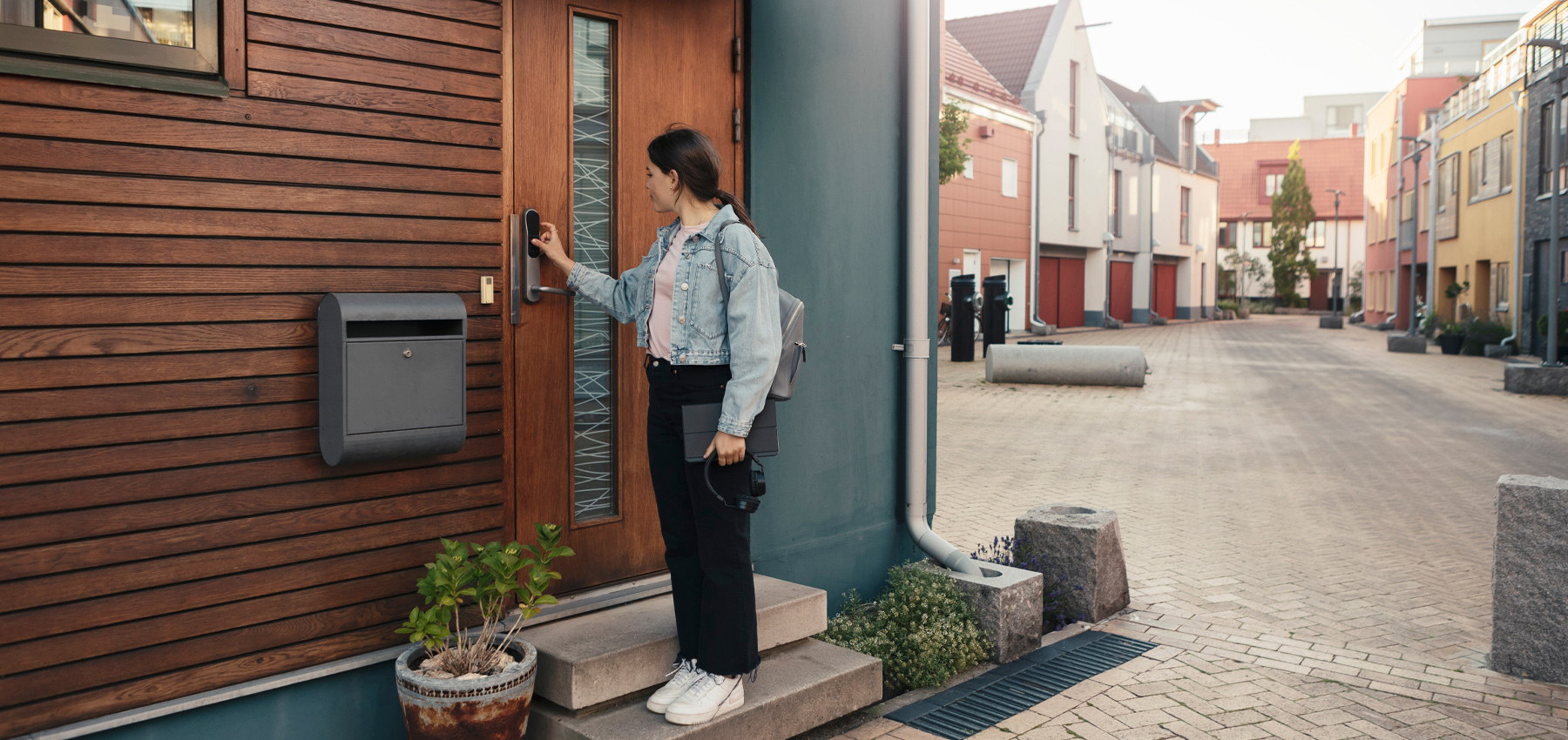For many newcomers, finding accommodation is one of the most important tasks you need to attend to once you arrive in Canada. Having secure and comfortable long-term accommodation gives you a base to settle as you begin your job search, navigate the school system (if you have children), and find a home. Accommodation-related costs often take up a maximum portion of your monthly expenses. This is why it’s important in the beginning to adhere to your budget and control spending as you look for job opportunities and a more permanent home.
For people who choose to settle in Quebec, here’s what you need to know about finding both short- and long-term accommodation in Montreal.
In this article:
- Types of short-term budget stay options
- How to find permanent, long-term accommodation while on a budget
| Are you moving to Montreal and looking for more information on how to rent? Check out these resources – |
Types of short-term budget stay options available in Canada
When you first arrive in Canada, you’ll need somewhere to stay and get settled. If you’re not able to rely on the support of family or friends already living in Montreal, that usually means finding suitable short-term accommodation. This is temporary accommodation for a period of a few weeks to a few months in length. Typically, short-term accommodation is cheaper than staying in a hotel. In Montreal, there’s plenty of different kinds of short-term housing and accommodation available.
In Montreal, in most cases, you don’t have to sign a formal lease to secure a place, unless it’s a sublet. |
Here are some of the different types of accommodation you can expect to find:
1. Serviced apartment: A serviced apartment, also known as an “apartment hotel,” is like having your very own apartment. Often these apartments are available on a short-term basis (from one month onwards) in apartment buildings or are part of a hotel. The advantage of a serviced apartment is the costs are far cheaper than staying in a comparable hotel suite. Different options are available – from one to three bedrooms – and you will have everything you need such as a fully stocked kitchen, bedding and towels, as well as laundry facilities. Depending on the type of building your serviced apartment is in, you may also have access to amenities such as an indoor swimming pool and gym. Individual serviced apartment companies can be searched online, or through sites like Airbnb, Kayak, Trivago or Anyplace.
2. Hostel: Most people think of hostels as only being for the youth, however, that’s no longer true. Hostelling International (HI) Canada operates 51 hostels coast-to-coast across Canada, including seven hostels in Quebec – one of which is in downtown Montreal. You can be any age and take advantage of staying in a hostel. You’ll often find private rooms or four-person rooms available, which are ideal if you’re travelling as a couple or a family. Not only are hostels significantly cheaper than staying in a hotel, they’re often located in downtown areas and you’ll have access to a kitchen and living area. Best of all is the opportunity to meet new people from other countries!
3. Shared accommodation: Long-term shared accommodation is another option. This is a great step for giving yourself some stability and sharing an apartment or house with others while finding a place of your own. You should expect to have your own bedroom and share other living areas with the kitchen, living room and bathroom, with other tenants. Advertisements for shared accommodation can be found through classified online ads or through sites like Roomies.
4. Sublet: Sublets are common in Montreal, especially as there are many students who live in the city. A sublet is where you take over an apartment on a short-term basis from the person who is the tenant. They will have signed a tenancy agreement with a landlord and it’s usually their responsibility to find someone to sublease their apartment and notify the landlord. However, the original tenant may ask you to sign a contract which outlines the terms of the sublet. The great thing about subletting is you may find a fully furnished apartment for a price that is cheaper than a serviced apartment. To find a sublet in Montreal, check out Sublet.com or the public Facebook group for Montreal apartments, roommates and sublets.
5. University residence: Another great option for settlers arriving in Canada in the spring and summer months is university and college residence. Generally from May to mid-August when university terms are over, student residences are empty. Rooms are then booked to summer students, travellers, or other visitors through the university’s student residence or housing departments. Accommodation is often clean and modern, and two or three bedroom suites with a kitchen and bathroom is available. Rooms are usually available at a weekly or monthly rate and most residences have 24-hour security available. You’ll need to contact colleges and universities in Quebec directly to inquire or make a booking.
| Get more information on how to rent without a credit history in Canada See How to rent an apartment with no credit history or job letter in Canada for tips on how to showcase your reliability as a tenant and where to focus your search. |
Finding permanent, long-term accommodation while on a budget
Most affordable neighbourhoods in Montreal for long-term accommodation
The cosmopolitan city of Montreal is home to world-class cultural events and restaurants. The city has a rich history dating back to the 16th century when it began as a missionary settlement but soon became a fur-trading centre. Montreal is filled with pockets of diverse and charming neighbourhoods. Currently, the average rent in Montreal for a one-bedroom apartment is approximately $1,380 CAD.
| Familiarize yourself with different neighbourhoods in Montreal Check out – |
Here are some of the most affordable neighbourhoods for long-term accommodation in Montreal:
1. Vieux-Rosemont
- Location: Situated in the centre-east of the city.
- Community: Neighbourhood is filled with restaurants and independent stores, with close proximity to Metro stations and plenty of green space.
- Housing landscape: Older, charming apartment buildings and newer condos.
- Average rent: Approximately $1,138 CAD for a one-bedroom apartment.
- Prominent stay options in the area: Gîte du Survenant Montréal
2. Montréal-Nord
- Location: Situated along the Rivière des Prairies, in the northeastern part of the Island of Montreal.
- Community: Traditionally working class community with pockets of middle-class and upper-class areas and is also home to one of Canada’s largest Haitan communities. Nearby is Montreal’s oldest church, dating back to 1749 and a historically-rich 34-hectare park.
- Housing landscape: Bungalow and two-story homes, as well as newer apartment buildings.
- Average rent: Approximately $875 CAD for a one-bedroom apartment.
- Prominent stay options in the area: Hotel Newstar and Days Inn by Wyndham Montreal East.
3. Pointe-aux-Trembles
- Location: This neighbourhood is situated on the far east end of the Island of Montreal.
- Community: Pointe-aux-Trembles is where you’ll find the tallest windmill in Quebec, built in 1719 and the Pointe-aux-Prairies Nature Park. The community provides easy access to public transit and has recently become home to communities from Italy, Haiti and Algeria.
- Housing landscape: Newer townhouses and contemporary apartment buildings, as well as semi-detached homes.
- Average rent: Approximately $1,150 CAD for a one-bedroom apartment.
- Prominent stay options in the area: Best Western Plus Montreal East and the Motel Le Paysan.
4. Lachine
- Location: Situated southwest of the Island of Montreal, between LaSalle and Dorval.
- Community: The charming neighbourhood offers unique architecture and great restaurants. It’s also the location of Montreal’s famous Lachine Canal.
- Housing landscape: Block apartment buildings, as well as duplexes.
- Average rent: Approximately $1,100 CAD for a one-bedroom apartment.
- Prominent stay options in the area: Hotels include Fairfield Inn & Suites by Marriott Montreal Airport and the Kaynelly Guest House.
5. Laval
- Location: Laval lies north of the Island of Montreal and is the largest suburb in Montreal.
- Community: Laval is a prosperous city with commercial and industrial industries and is home to communities from Italy, Greece, the Middle East, Romania and Portuguese.
- Housing landscape: Row houses, detached homes, and condominium buildings.
- Average rent: Approximately $1,250 CAD for a one-bedroom apartment.
- Prominent stay options in the area: Hôtel Ô Laval and Olux Hotel Motel & Suites.
6. Longueuil
- Location: The city of Longueuil is located directly across from the Island of Montreal, on the south shore of the Saint Lawrence River.
- Community: The largest community are people from Europe, as well as Black, Latin American, Middle Eastern and South Asian. Longueuil is home to three nature parks as well as a wildlife reserve and has a strong aerospace industry.
- Housing landscape: Wide range of housing available, from bungalow houses and detached two story homes, to older apartment buildings and modern condominiums.
- Average rent: Approximately $975 CAD for a one-bedroom apartment.
- Prominent stay options in the area: Plenty of hotel options available, including the Holiday Inn Montreal-Longueuil, Sandman Hotel Montreal-Longueuil, and Hôtel Le Dauphin Montréal-Longueuil.
Where to search for long-term accommodation in Montreal
Now that you’ve got some idea of which neighbourhood you’d like to live in when you first settle in Montreal, you’ll need to start finding the right long-term accommodation for you and perhaps your family. Here is where and how to look:
Online
There’s a wide selection of online sites designed to help you find long-term accommodation in Toronto. Here are some of the most popular ones you can use in your search:
- Airbnb: When it comes to finding long-term accommodation, Airbnb has plenty of options available. You can search in the exact neighbourhood you’d like to live, adjust the length of your stay, number of guests including children, even select accommodation that allows pets. You’ve also got access to photos, a list of amenities included and reviews of the property and host to help you make your decision.
- PadMapper: Padmapper is an online search engine designed to make apartment hunting easier. You can use the search tools to select the range of rent you’re willing to pay, number of bedrooms, and if you’re looking for short-term or long-term accommodation. It also has a map feature where you can broaden or narrow your search.
- Kijiji: Kijiji is an online advertising service that Canadians can use to post a classified ad and buy, sell or trade just about anything – from cars to jobs to accommodation. Anyone offering long-term accommodation can post an ad privately. The site includes information on utilities, as well as how long an ad has been listed for. As well as being the most popular online classified site in Canada, it’s also a great resource for researching the rental market and discovering what’s currently available. Sadly, scams happen to people when they rent through a classified online ad. To protect yourself, do not make any payments before you or someone else has inspected the property. Alternatively, they may try to organize a transaction that isn’t face-to-face. Kijiji has put together some helpful guidelines when it comes to avoiding rental scams and how you can protect yourself during COVID-19.
- Craigslist: Craigslist is a similar site to Kijiji and runs classified ads for housing in various cities in Canada. You can use their site to look for temporary accommodation in Toronto and the GTA, or post your own wanted ad stating what you’re ideally searching for. Like Kijiji, if you’re searching for accommodation online through Craigslist, protect yourself from potential scams by seeing a property before committing to rent it and using a secure cashless payment method.
- Montreal Apartments/Logements Montréal: This public Facebook group connects people looking for an apartment, as well as those who wish to sublet their apartment. The group has over 63,000 members.
Word of mouth
If you already have family, friends of work colleagues in Toronto and the GTA, then these people are a great resource for finding long-term accommodation. Let them know ahead of arriving in Canada that you’re looking for somewhere to stay and ask them to keep you in mind if they hear of anything. Make use of the network you already have in your new home to help you in your search!
Community services
Many cities and towns have organizations that serve newcomers to Canada. One of the ways they’re able to help settlers is in finding suitable accommodation. Look to see if there’s a service nearby and take advantage of confidential and free advice. A list of newcomer services in Montreal is also available.
Walking around
If there’s a neighbourhood in Montreal you have your heart set on living in, then another way to find long-term accommodation is to take a walk around the neighbourhood. You may find notices for shared accommodation or an apartment coming up for rent in the local coffee shop or on a sign outside an apartment building.
Tips to find budget accommodation in Montreal
Finding a place to live in Montreal is one thing, finding long-term accommodation that fits your budget is another. Here are a few things to help you:
1. Negotiate
Perhaps you’ve found the perfect long-term accommodation in the right neighbourhood, but it’s outside of your budget. If it’s being rented by the month, ask if they can negotiate on the price for a longer-term stay or for paying in full upfront, if you plan to stay for one month or more. With the effect of COVID-19 on the rental market and decreasing rent prices in major cities in Canada, now is a good time to negotiate. While the answer may be no, there’s nothing lost by asking confidently and respectfully.
2. Search in the late fall or winter
The spring and summer months are popular times for moving in Canada. It’s when university is out or families want to settle prior to kids going back to school in September. Therefore, there’s more competition or you may find your options are more limited to more expensive accommodation. If you can, search later in the fall, during the winter or early spring when demand is low.
3. Consider other expenses
While housing is typically one of the largest expenses in a budget, when it comes to finding the right long-term accommodation in Montreal, consider other expenses as well, such as public transportation. For example, a cheaper rental in the suburbs of Montreal isn’t as cheap if you’re also paying additional costs to commute by Exo to your job. Factor in other monthly expenses too, including utilities like electricity and gas, which are usually not included in your rent, as well as other expenses such as home internet or parking costs.
Finding the right short- and long-term accommodation is an important first step in moving to another country. Maximize your success by researching the market ahead of time. That way, you’ll be in a better position to hit the ground running as you start your new life in Montreal!





